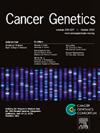30. Current next generation sequencing reporting practices: A GOAL Consortium report
IF 1.4
4区 医学
Q4 GENETICS & HEREDITY
引用次数: 0
Abstract
Molecular testing by next generation sequencing (NGS) panels are widely used for oncology specimens; however, the reporting of the results vary greatly across institutions. A 70-question survey was sent to member laboratories in the Genomics Organization for Academic Laboratories (GOAL) consortium to assess current reporting practices to assess the potential for standardization. GOAL is a non-profit organization with aims of cross-institutional collaborations, including shared assay content and interpretative frameworks, to allow for academic laboratory success. Each laboratory had the opportunity to fill out the survey for hematological and solid tumor-based panels or a combined survey for both types of tumors. A total of 28 surveys were received from 21 academic tertiary-care laboratories regarding NGS reporting practices. Only a few practices differed significantly between heme and solid tumor panels, including repeat testing. Most notably, the survey respondents noted the time and review process for testing was formidable, including review of previous results, care in reporting potential germline findings, and integrating other ancillary testing. Through these efforts, GOAL seeks to bridge the gap in result reporting, ultimately improving consistency and accuracy of NGS-based molecular testing for cancer. We anticipate the results of this study will help serve as a benchmark for clinical laboratories looking to compare practices with their peers and reveal potential areas for standardization or improvement of clinical reporting.
30.下一代测序报告的现行做法:GOAL 联合会报告
下一代测序 (NGS) 面板分子检测广泛用于肿瘤标本;然而,不同机构对结果的报告却大相径庭。我们向学术实验室基因组学组织(GOAL)联盟的成员实验室发送了一份包含 70 个问题的调查问卷,以评估当前的报告实践,从而评估标准化的潜力。GOAL 是一个非营利性组织,其宗旨是开展跨机构合作,包括共享检测内容和解释框架,从而使学术实验室取得成功。每个实验室都有机会填写血液肿瘤和实体瘤样本的调查表,或同时填写两类肿瘤的调查表。21 家三级医疗学术实验室共收到 28 份有关 NGS 报告实践的调查问卷。只有少数几个实验室在血红素样本和实体瘤样本(包括重复检测)方面有明显差异。最值得注意的是,调查对象指出检测的时间和审查过程非常繁琐,包括审查以前的结果、谨慎报告潜在的种系发现以及整合其他辅助检测。通过这些努力,GOAL 试图缩小结果报告方面的差距,最终提高基于 NGS 的癌症分子检测的一致性和准确性。我们预计,这项研究的结果将有助于为临床实验室提供一个基准,帮助他们与同行进行比较,并揭示临床报告标准化或改进的潜在领域。
本文章由计算机程序翻译,如有差异,请以英文原文为准。
求助全文
约1分钟内获得全文
求助全文
来源期刊

Cancer Genetics
ONCOLOGY-GENETICS & HEREDITY
CiteScore
3.20
自引率
5.30%
发文量
167
审稿时长
27 days
期刊介绍:
The aim of Cancer Genetics is to publish high quality scientific papers on the cellular, genetic and molecular aspects of cancer, including cancer predisposition and clinical diagnostic applications. Specific areas of interest include descriptions of new chromosomal, molecular or epigenetic alterations in benign and malignant diseases; novel laboratory approaches for identification and characterization of chromosomal rearrangements or genomic alterations in cancer cells; correlation of genetic changes with pathology and clinical presentation; and the molecular genetics of cancer predisposition. To reach a basic science and clinical multidisciplinary audience, we welcome original full-length articles, reviews, meeting summaries, brief reports, and letters to the editor.
 求助内容:
求助内容: 应助结果提醒方式:
应助结果提醒方式:


